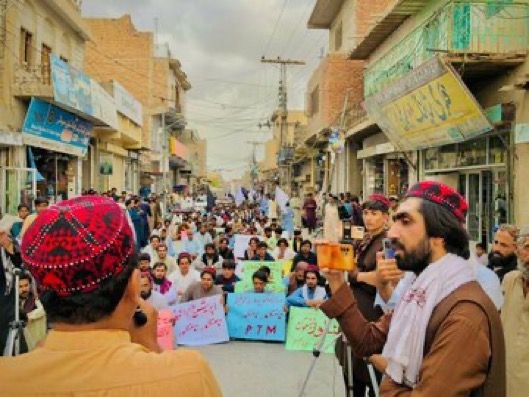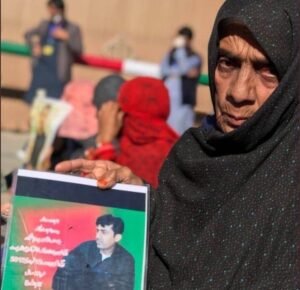Pashtun Voices Rise Against Pakistan’s Military Operation in Khyber Pakhtunkhwa

@PTM X
By Shinwari
Residents of Pakistan’s Swat Valley and Orakzai tribal district have recently taken to the streets to protest a newly announced military operation by the federal government. Organized by the Ulasi Pasoon (Public Revolution) and the Orakzai Peace Movement, these rallies on July 5 saw political workers, rights activists, and students carrying placards demanding peace and security while condemning the planned military intervention. This protest underscores the longstanding opposition of local residents to military operations, which they claim have resulted in significant displacement and disruption of lives and businesses in the predominantly Pashtun regions of Khyber Pakhtunkhwa Province.
For years, the Pashtun communities in Khyber Pakhtunkhwa have borne the brunt of the military’s counterterrorism campaigns. The recently approved Resolve For Stability operation aims to combat rising extremist violence and terrorist attacks in the region, which have been primarily attributed to Islamist extremist groups like Tehrik-e Taliban Pakistan (TTP) and affiliates of Islamic State (IS). Despite assurances from Prime Minister Shehbaz Sharif’s office that this operation would not lead to large-scale displacement, locals remain skeptical, fearing a repeat of past tragedies.
Historically, military operations in Khyber Pakhtunkhwa have had devastating consequences for the civilian population. During the 2014 Operation Zarb-e Azab, aimed at rooting out militants in North Waziristan, many local Pashtuns lost their livelihood and home. Many were forced to relocate to the neighboring district of Bannu. However, when they returned later, their businesses and homes were found destroyed. The compensation from government was minimal, a mere $5,000 for losses that far exceeded $100,000.
These tragic narratives are echoed across Khyber Pakhtunkhwa, where military operations have displaced millions and led to significant loss of life. Since 2003, over 80,000 civilians, soldiers, and militants have been killed in terrorist attacks and military counterterrorism efforts across Pakistan, with Pashtuns in Khyber Pakhtunkhwa bearing the heaviest toll. Beyond the immediate physical destruction, these operations have also sown deep-seated distrust between the local population and the national authorities.
Critics argue that the government’s counterterrorism strategies have been more about maintaining geopolitical alliances and securing economic interests than genuinely addressing the root causes of militancy. For instance, the latest operation is seen by many as an effort to protect Chinese investments under the China-Pakistan Economic Corridor (CPEC) rather than a sincere attempt to combat terrorism. This perception is reinforced by past instances where counterterrorism operations were linked to securing aid dollars from international partners, particularly the United States.
The provincial government in Khyber Pakhtunkhwa, led by the opposition Pakistan Tehrik-e Insaf (PTI) political party, has also voiced strong opposition to the new military operation. Efforts are underway to unify political and tribal leaders against this initiative. Many activists, such as Alamzaib Khan Mehsud from South Waziristan, argue that the federal government’s approach is fundamentally flawed. They believe that Islamabad’s counterterrorism efforts are superficial and profit-driven, failing to dismantle major militant organizations while causing widespread suffering among civilians.
Despite mounting criticism, the federal government insists that the new operation will be different, emphasizing targeted raids over large-scale military campaigns. However, the memories of previous operations still haunt the residents of Khyber Pakhtunkhwa. There is a pervasive fear that once again, they will suffer immense losses without achieving meaningful security improvements.
In Miran Shah, many locals are strongly against any new military operations. The community’s resilience and determination to protect their homes and businesses underscore a broader sentiment across Khyber Pakhtunkhwa: enough is enough. The call for peace and stability resonates strongly, as residents demand an end to operations that have repeatedly disrupted their lives and livelihoods.
The suffering of Pashtuns in Khyber Pakhtunkhwa due to military operations is a stark reminder of the human cost of conflict. As the region braces for the potential impacts of the Resolve For stability operation, the voices of those calling for a different approach must not be ignored. Their plea is clear: real security can only be achieved through genuine efforts to address the root causes of extremism and violence, not through military might alone.
Author chooses a single pseudonym. Shinwari is a freelance journalist based in Peshawar, Pakistan.
Note: The contents of the article are of sole responsibility of the author. Afghan Diaspora Network will not be responsible for any inaccurate or incorrect statement in the articles.










